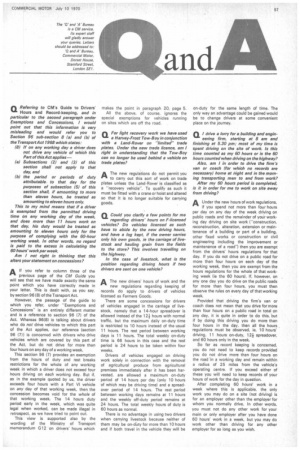Q Referring to CIVI's Guide to Drivers' Hours and Record-keeping, and in particular to the second paragraph under
Page 59

If you've noticed an error in this article please click here to report it so we can fix it.
Exemptions and Concessions, would point out that this information is very misleading and would refer you to Section 96 sub-section 8 (a) and (b) of the Transport Act 1968 which states:
(8) If on any working day a driver does not drive any vehicle of which this Part of this Act applies—
(a) Subsections (2) and (3) of this section shall not apply to that day, and (b) the period or periods of duty attributable to that day for the purposes of subsection (5) of this section shall, if amounting to more than eleven hours, be treated as amounting to eleven hours only.
This to my mind means that if a driver is exempted from the permitted driving time on any working day of the week and does more than 11 hours work on that day, his duty would be treated as amounting to eleven hours only for the purpose of complying with the 60-hour working week. In other words, no regard is paid to the excess in calculating the 60 hours' work per week.
Am I not right in thinking that this alters your statement on concessions?
AIf you refer to column three of the previous page of the CM Guide you will see that we have made exactly the same point which you have correctly made in your letter. This is dealt with, as you say, by section 96 (8) of the Transport Act.
However, the passage of the guide to which you refer, under "Exemptions and Concessions" is an entirely different matter and is a reference to section 96 (7) of the Act. Whereas 96(8) is talking about drivers who do not drive vehicles to which this part of the Act applies, our reference (section 96 (7)) is concerned with drivers who drive vehicles which are covered by this part of the Act, but do not drive for more than four hours on any day of a working week.
This section 96 (7) provides an exemption from the hours of duty and rest breaks restrictions for the whole of any working week in which a driver does not exceed four hours driving on each working day. But if, as in the example quoted by us, the driver exceeds four hours with a Part VI vehicle on any day of that working week, then the concession becomes void for the whole of that working week. The 14 hours duty period early in the week, which was quite legal when worked, can be made illegal in retrospect, as we have tried to point out.
This view is supported also by the wording of the Ministry of Transport memorandum G12 on drivers' hours which
makes the point in paragraph 20, page 5. All the above, of course, ignores the special exemptions for vehicles running on sites which are off the road.












































































































